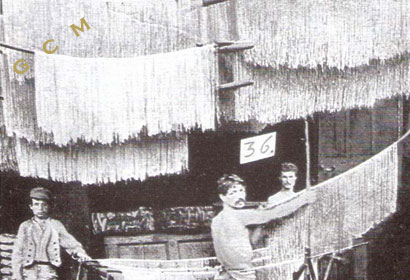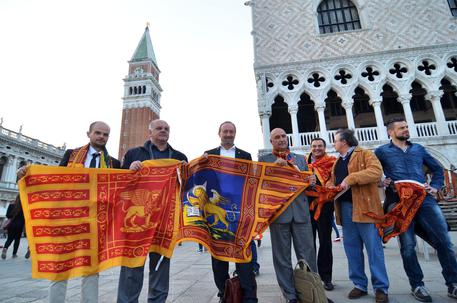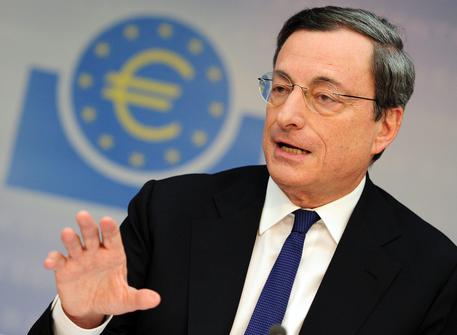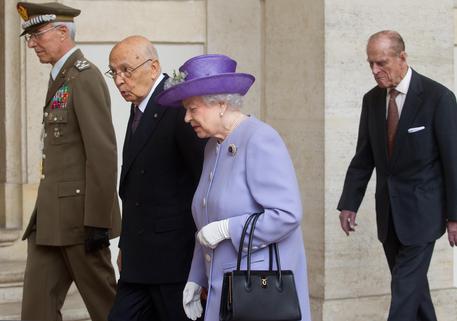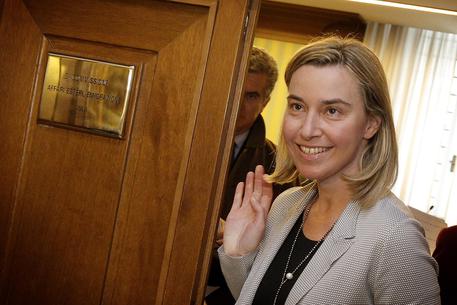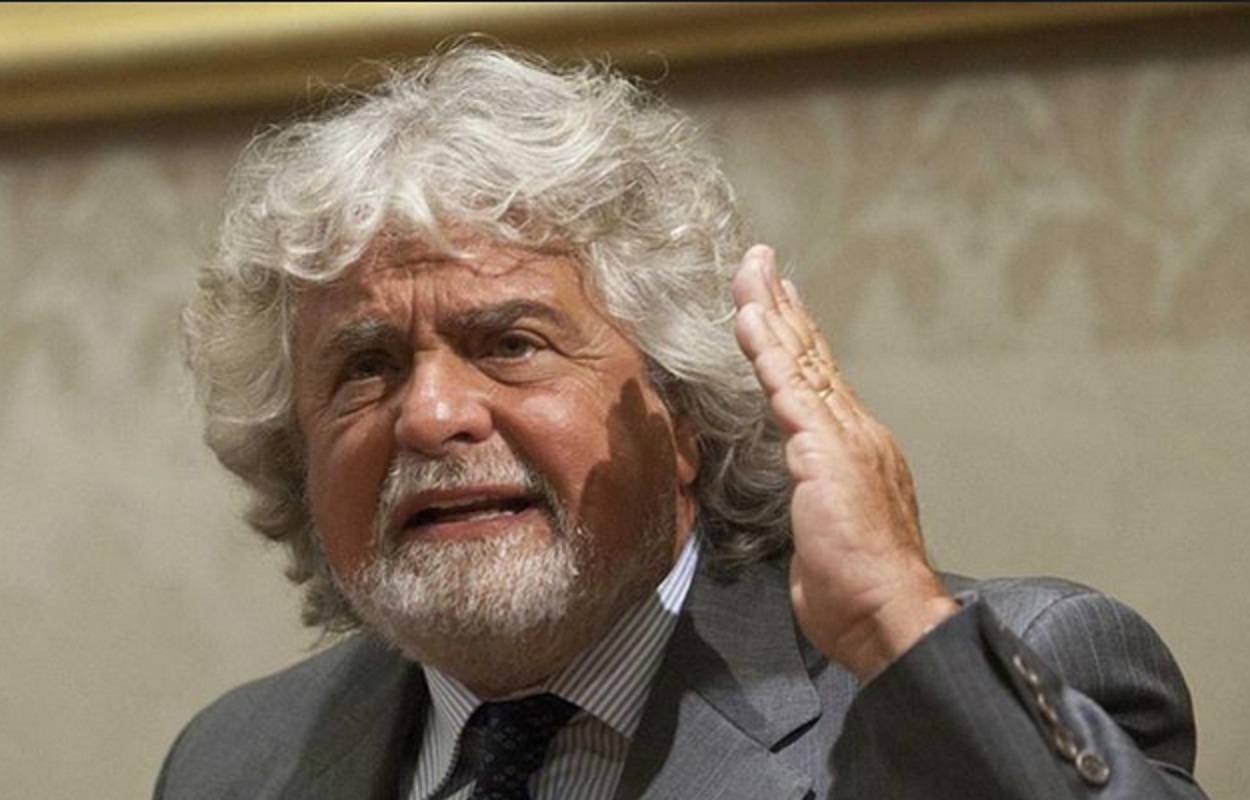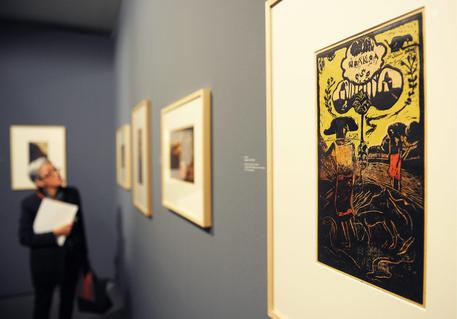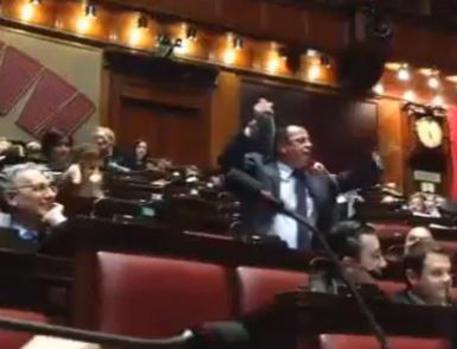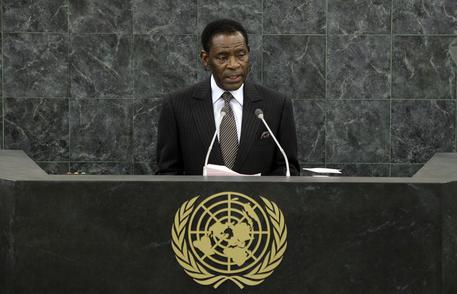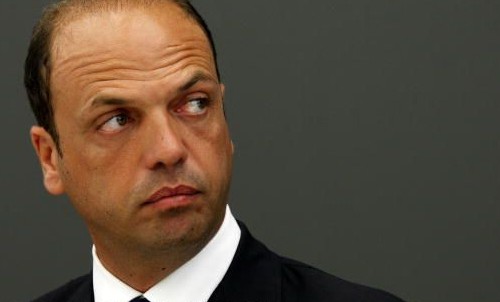Translate
sabato 5 aprile 2014
Two Italian priests kidnapped in Cameroon
The priests and a Canadian nun were kidnapped from their place of residence by armed men in the country's north.
Two
Italian priests and a Canadian nun have been kidnapped by gunmen in
northern Cameroon, a bishop and a government source said, in the
latest kidnapping incident targeting Christian clergy in the African
country. "Doors
were broken towards midnight by unknown people and the religious were
taken away. We do not know where they are. The act is not yet claimed
but we imagine who is behind this kidnapping," Bishop Phillippe
Stevens told Reuters news agency on Saturday from the parish of
Maroua where the kidnapping took place. He named the priests as
Giampaolo Marta and Gianantonio Allegri, both missionaries sent out
by the diocese of Vicenza in northeast Italy, and the nun as Gilberte
Bissiere.
The Italian
foreign ministry said that two priests had been seized, but gave no
other details. Local governor Augustine Fonka Awa told Reuters that
Bissiere was in her 70s and ill and had intended to return to Canada
when she was seized.
Pope Francis
was aware of the kidnappings and praying for those taken, the Vatican
press office said. Government sources in northern Cameroon said armed
forces were attempting to free the hostages, without going into
further details.
Allegri
had written to his home diocese last month saying local authorities
had advised him to travel with a police escort. "Even if on the
surface you do not notice anything in particular that is
alarming, it is palpable in our feelings and our conversations,"
he wrote in the letter dated March 12 posted on the diocesan website.
Italian daily Corriere della Sera reported on its website that the
victims were staying in the northern Maroua region, which borders
northern Nigeria, a stronghold of the Boko Haram rebel group.
The attack comes three months after the release of French priest Georges Vandenbeusch, who was kidnapped in the same region in mid-November 2013 and then held in neighbouring Nigeria by Boko Haram. One of the two priests taken on Friday night had been in Cameroon for more than six years, while the second had arrived around a year ago, Ansa news agency reported.
The attack comes three months after the release of French priest Georges Vandenbeusch, who was kidnapped in the same region in mid-November 2013 and then held in neighbouring Nigeria by Boko Haram. One of the two priests taken on Friday night had been in Cameroon for more than six years, while the second had arrived around a year ago, Ansa news agency reported.
The history of Italian Pasta
A National treasure, known all around the world
Nothing
says Italy like its food, and nothing says Italian food like pasta.
Wherever Italians immigrated they have brought their pasta along, so
much so today it can be considered a staple of international cuisine.
Unlike other ubiquitous Italian products like pizza and tomato sauce,
which have a fairly recent history, pasta may have a much older
pedigree, going back hundreds -if not thousands- of years.
Unravelling the long and often complex history of this dish we have
to look at its origins and some of the myths surrounding it.
Many
schoolchildren were taught that the Venetian merchant Marco Polo
brought back pasta from his journeys to China. Some may have also
learnt that Polo's was not a discovery, but rather a rediscovery of
product once popular in Italy among the Etruscans and the Romans.
Well, Marco Polo might have done amazing things on his journeys, but
bringing pasta to Italy was not one of them: noodles were already
there in Polo's time.
There
is indeed evidence of an Etrusco-Roman noodle made from the same
durum wheat used to produce modern pasta: it was called "lagane"
(origin of the modern word for lasagna). However this type of food,
first mentioned in the 1st century AD, was not boiled, as it is
usually done today, but ovenbaked. Ancient lagane had some
similarities with modern pasta, but cannot be considered quite the
same. The country will have to wait a few centuries for its most
popular dish to make a further culinary leap forward.
Like
so much of southern Italian life, the Arabic invasions of the 8th
century heavily influenced regional cuisine. Today, the presence of
Arabic people in the south of the peninsula during the Middle Ages is
considered the most likely reason behind the diffusion of pasta.
The
modern word "macaroni" derives from the Sicilian term for
kneading dough with energy, as early pasta making was often a
laborious, day-long process. How these early dishes were served is
not truly known, but many Sicilian pasta recipes still include
typically middle eastern ingredients, such as raisins and cinnamon,
which may be witness to original, medieval recipes.
This
early pasta was an ideal staple for Sicily and it easily spread to
the mainland since durum wheat thrives in Italy's climate. Italy is
still a major producer of this hard wheat, used to make the
all-important semolina flour.
By
the 1300's dried pasta was very popular for its nutrition and long
shelf life, making it ideal for long ship voyages. Pasta made it
around the globe during the voyages of discovery a century later. By
that time different shapes of pasta have appeared and new technology
made pasta easier to make. With these innovations pasta truly became
a part of Italian life. However the next big advancement in the
history of pasta would not come until the 19th century when pasta met
tomatoes.
Although
tomatoes were brought back to Europe shortly after their discovery in
the New World, it took a long time for the plant to be considered
edible. In fact tomatoes are a member of the nightshade family and
rumors of tomatoes being poisonous continued in parts of Europe and
its colonies until the mid 19th century. Therefore it was not until
1839 that the first pasta recipe with tomatoes was documented.
However shortly thereafter tomatoes took hold, especially in the
south of Italy. The rest of course is delicious history.
It
is estimated that Italians eat over sixty pounds of pasta per person,
per year easily beating Americans, who eat about twenty pounds per
person. This love of pasta in Italy far outstrips the large durum
wheat production of the country; therefore Italy must import most of
the wheat it uses for pasta. Today pasta is everywhere and can be
found in dried (pasta secca) and fresh (pasta fresca) varieties
depending on what the recipes call for. The main problem with pasta
today is the use of mass production to fill a huge worldwide demand.
And while pasta is made everywhere the product from Italy keeps to
time-tested production methods that create a superior pasta.
There
are roughly 350 different shapes and varieties of dried pasta in
Italy, even more counting regional differences. Shapes range from
simple tubes to bow ties (farfalle, which actually means
"butterfly"), to unique shapes like tennis rackets
(racchette). Many, but not all of these types are usually available
wherever pasta is made. By Italian law dried pasta must be made with
100% durum semolina flour and water, a practice that all but the
worst quality pasta makers worldwide have since adhered to. However
there are two factors in dried pasta from Italy that make it
typically better than most other products: extrusion and drying
methods.
Dried
pasta, especially the more complex shapes (such as radiatore) are
designed for grabbing and holding onto sauces. Dried tube pasta (ziti
or penne) often has ridges or slight abrasions on the surface to hold
onto the pasta sauce as well. These ridges and bumps are created
during the extrusion process, when the pasta is forced from a copper
mold and cut to desired length before drying. These molds, while
expensive and prone to wear are favored for making the best dried
pasta. However most producers worldwide use steel molds that produce
pasta that is too smooth to hold onto sauce. Fortunately more pasta
makers outside of Italy are starting to use the older style copper
molds.
After
the pasta is cut it must be dried using a process of specific
temperature and time. This is another area where mass produced pasta
falls short of good Italian pasta made the correct way. The mass
produced pastas are dried at very high temperatures for a shorter
time than quality pasta. Traditional pasta is allowed to dry slower,
up to 50 hours at a much lower temperature. It is after the pasta is
fully dried that it is packaged. The result is a product with a much
better mouth-feel, quicker cooking time, and superior sauce holding
noodles.
Essentially
all pasta starts out as fresh pasta but some is made to be eaten
"soft". Fresh pasta can be made with slightly different
ingredients than the dried variety. Many northern regions of Italy
use all-purpose flour and eggs while southern Italy usually makes
theirs from semolina and water but it depends upon the recipe.
Serving pasta that is made fresh that day shows a great deal of care
in preparation and a high level of pride in the household's culinary
skills. However fresh pasta is not inherently better than dried
pasta, it is just different and is used in different situations. Some
types of pasta are served only fresh, others only dried and some
others can have fresh and dried versions. It is in this case that it
can be argued that fresh is better than dried pasta. Fresh pasta has
been made in households throughout Italy for generations but the
region of Emilia-Romagna has the reputation of making the best. Here
fresh pasta is often served with cream sauces or a simple sauce of
butter and sage while light tomato sauces are reserved for the summer
months. Following the simple but important rule of using fresh local
ingredients, the Piedmontese serve their fresh pasta with a butter
sauce covered with slices of decadent local black truffles. Wherever
you are in Italy, being served fresh homemade pasta is a real treat
as you can be assured that the pasta was made that day and will have
a taste that will make you rethink notions of what good pasta is.
When
buying either fresh or dried pasta, look for a well made brand that
uses the best ingredients such as only semolina flour for dried
pasta. The pasta should have a rough surface and not too smooth, as
smooth pasta will not hold onto sauce. The noodles should be compact
and heavy for their size in order to stay together when cooking.
Remember to stay away from mass-produced cheap pasta, you will just
be disappointed come dinnertime. For fresh pasta look for the
expiration date on the package and take a good look at the pasta. If
it looks cheap then it probably is, if the pasta feels heavy in the
package and has a nice color and texture it is worth buying. Many
Italian bakeries and grocerias also make fresh pasta that will be
better than anything you could find at a supermarket and you may even
get a family sauce recipe as well. However remember not to overcook
your pasta, the worlds greatest sauce cannot save mushy pasta.
It
cannot be stressed enough; cook pasta until it is al dente, firm to
the teeth yet tender. Many Americans cook pasta until it is too soft,
a minute or two less of cooking time will give you authentic Italian
pasta. Fresh pasta will take even less time to be cooked to
perfection. Another key to perfect pasta is to use a large cooking
pot and plenty of water; this will stop the pasta from sticking and
will also ensure every inch of pasta will be cooked though. Don't
forget to add plenty of salt to the cooking water before adding the
pasta, good pasta is almost never has salt in it so this is the only
time it can be seasoned. Some people add a little olive oil to the
cooking water to stop the pasta from sticking and while that works
for larger pasta like lasagna it is not necessary if you use a large
pot, plenty of water and remember to stir the pasta. When draining
the pasta remember to save about a cup of the water in the pot, this
starchy water will add a little body to whatever sauce you choose.
Never, ever rinse off the pasta after cooking unless you're making
pasta salad. Washing off all that starch and salt will kill any
flavor your pasta once had.
When
it comes to sauce it is really up to personal preference unless you
are trying to follow a traditional recipe. A good rule is to remember
simple pasta works best with simple sauces while complex shaped
pastas are ideal for thicker sauces. There is no shortage of great
pasta and sauce combinations and each is worth trying. However it is
important that you use high quality pasta cooked properly to ensure
authentic flavor.
Arrested Veneto separatist says he's 'prisoner of war'
Terrorist suspect exercises right to remain silent
(ANSA)
- Vicenza, April 4 - Arrested Veneto separatist Luigi Faccia declared
himself a "prison of war" on a Friday when he appeared
before a preliminary hearing judge in a Vicenza prison.
According to defense lawyers Andrea Arman and Alessandro Zagonel, Faccia read a statement to the judge saying: "As head of the Venetian Liberation, servant of the Most Serene Republic of Venice, I declare myself a prisoner of war". Faccia did not respond to the judge, exercising his right to remain silent before reading the statement. He later announced his citizenship as "Venetian". Faccia is one of 24 Veneto separatists arrested Wednesday and suspected of crimes that include criminal association for terrorism and subversion of the democratic order. Also included in the arrest was former MP Franco Rocchetta, the founder of the Liga Veneta (Veneto League) separatist party.
Last month separatists organized an unofficial referendum in which an overwhelming majority of participants voted in favor of leaving Italy, which some claim more approximately two million people participated, a figure disputed by many critics. Among their complaints, the separatists said their region is paying more in taxes than it can afford, and do not receive enough government services or authority in return.
The economic crisis has increased support for independence in the northeastern region of Veneto, where many blame central government for bleeding local businesses dry with high taxation.
The Liga Veneta was a founding member of Northern League, a federation of regionalist parties which has recently upped its drive for greater autonomy for wealthy northern regions and started calling for outright independence again, the original demand of its early years.
venerdì 4 aprile 2014
Spread slides to 160 basis points on Draghi's words
Confidence boosted after ECB discusses 'unconventional' tools
(ANSA)
- Rome, April 4 - The spread between Italy's 10-year bond and its
ultra-safe German equivalent slipped to 161 basis points in early
trading Friday, signaling investor confidence following reassuring
words one day earlier by the president of the European Central Bank.
At one point, the spread dipped to 160 basis points, with the yield
on Italian 10-year paper falling to 3.23% after Mario Draghi said
that the ECB would consider unconventional measures if necessary.
The bond spread is an important measure of investor confidence in Italy and of the country's borrowing costs. Italy risked a Greek-style financial meltdown late in 2011 when the spread went over 500 points with yields above 7%. On Thursday, the ECB held its main interest rate steady at 0.25%, while Draghi said that he would take whatever measures are needed to maintain price stability.
Draghi's pledge suggests the ECB is considering 'unconventional' measures that in other major countries has translated into buying government assets to help control interest rates. "We will consider all instruments available to us," he said. "We are resolute in our determination to maintain a high degree of monetary accommodation and act swiftly if required," added Draghi. "The Governing Council is unanimous in its commitment to using...unconventional instruments within its mandate in order to cope effectively with risks of a too prolonged period of low inflation".
'Shumacher showing signs of improvement' says manager
F1 champion in medically induced coma since Dec. ski accident
(ANSA)
- Berlin, April 3 - The condition of world champion Formula One
driver Michael Schumacher might be improving, his manager told
Germany's Bild newspaper Thursday. "There are encouraging signs
and perceptible improvements," said Sabine Kehm. Schumacher, 45,
a seven-time F1 world champion, suffered serious brain injuries after
hitting his head on a rock when skiing off-piste in the exclusive
French resort of Meribel on December 29. The Ferrari racing legend
has been in a medically induced coma since. Doctors have been
attempting to bring him gradually out of the coma by reducing
sedating medication.
Fendi Foundation unveils avant-garde 'experiments'
Avant-gard Fendi unveils annual contemporary art performances
(ANSA)
- Rome, April 2 - As Rome begins to wind down the season of Lent, the
Alda Fendi Foundation unveils its avant-garde 'Experiments', a series
of four multi-sensory performances using imagery, sound and
philosophy. On Thursday, the Fendi Foundation inaugurates Oceano
Adriatico (Adriatic Ocean), a glimpse into the life journey of
artistic director Raffele Curi. "This adventure is the journey
of my life," said Curi, who titled the series in reference to
the Le Marche region where he grew up, located on the Adriatic Sea.
"From San Benedetto del Tronto to Ravenna was my world," he
said, refering to towns in Le Marche. "It is where I dreamed and
it's where I go back to".
Born in Ancona, Curi moved to Rome to study theatre and was quickly chosen for a role in Vittorio de Sica's 1970 film The Garden of the Finzi-Continis. His cinema and artistic career includes two decades working with composer Gian Carlo Menotti on Spoleto's Festival dei Due Mondi, and a long-lasting friendship with Alda Fendi that would lead to interior design, art direction and the creation of the Alda Fendi Foundation. The Fendi 'Experiments' are the love child of Curi and Fendi, both of whom enjoy pushing art to the furthest limits.
Queen Elizabeth lunches with president before Pope visit
Monarch wears jeweled brooch decorated in diamonds, sapphires
(ANSA)
- Rome, April 3 - Queen Elizabeth II and her husband Prince Philip,
the duke of Edinburgh, met Italian President Giorgio Napolitano for
lunch at the Quirinal palace Thursday before an informal meeting with
Pope Francis. Dressed in a lavender-coloured coat and matching hat
decorated with spring flowers, the Commonwealth's queen landed at
12:30 p.m. local time at the Ciampino military airport on the western
edge of Rome, where she was greeted by Britain's ambassador
Christopher Prentice. She was greeted at the courtyard of the
presidential palace on Rome's famed Quirinal Hill, which boasts a
view towards her next stop, the Vatican, by an honour guard and a
military band that played the national anthems of Britain and Italy.
In an atmosphere described as pleasant, smiles were exchanged amid greetings in the English language, before the group moved on to lunch in the Quirinale's Hall of Bronzino, according to journalists observing the queen's arrival.
Decorating the queen's coat was a large brooch trimmed with gold, sapphire and diamonds, a gift from Mary, the former queen and Elizabeth's grandmother, who bought the piece of jewelry in 1934. It was presented as a gift to Elizabeth in 1953, the year of her formal coronation which followed her accession to the throne in 1952. The British flag, the Union Jack, fluttered in the breeze as the president and his wife Clio greeted the visitors from London, who will later travel across Rome to meet with the pope.
Elizabeth, who is also head of the Church of England, is expected to discuss issues around the role of faith in the world during her visit with Francis, Vatican Radio reported earlier in the day. The 87-year-old queen is coming to Rome after cancelling a March 2013 visit to Rome due to a gastrointestinal illness that required a brief hospitalisation. She has visited the Italian capital four times during her 62-year reign, the last time 14 years ago when she met former Pope John Paul II at the Vatican; however, this marks her first meeting with Francis.
Camorra-linked ex-Berlusconi undersecretary arrested
Nicola Cosentino suspected of unfair competition in petrol sales
(ANSA)
- Naples, April 3 - The Camorra mafia-linked politician Nicola
Cosentino, a former Berlusconi government undersecretary, was
arrested Thursday on suspicion of extortion and unfair competition in
connection with the sale of motor fuel in the southern Campania
region. Twelve other arrest warrants were also issued in the probe,
including ones against Cosentino's brothers Giovanni and Antonio and
Pasquale and Antonio Zagaria, brothers of Michele Zagaria, a former
boss of the powerful Casalesi clan of Campania's Camorra mafia whose
death threats have forced anti-mafia writer Roberto Saviano into
24-hour police protection.
The ex-prefect of the Campania city of Caserta, former centre-right lawmaker Maria Elena Stasi, is also being probed in relation to the case for suspected corruption and extortion. The Cosentino family, which own a number of petrol stations in the province of Caserta, is suspected of having used illicit methods including extortion and bribery to damage their competitors, with the help of alleged ties with the Casalesi. Investigators say Casalesi bosses banned their affiliates from demanding 'protection money' from service stations belonging to the Cosentino family.
Cosentino, a former economy undersecretary and ex regional coordinator for former premier Silvio Berlusconi's People of Freedom (Pdl) party, is already on trial for alleged collusion with the Casalesi in relation to the construction of a shopping mall near Caserta. Prosecutors in that case claimed he was the "national reference point" of the Casalesi, who come from his home town of Casal di Principe.
Cosentino denied all wrongdoing and Berlusconi described the case against him as an example of alleged judicial persecution. However, he did drop Cosentino from his centre-right party's candidate lists ahead of general elections in February 2013 amid concern over a possible political backlash.
Italian ambassadors' pay to feature in spending review
Foreign ministry aiming to save 108 million euros in 3 years
(ANSA)
- Rome, April 3 - Italian Foreign Minister Federica Mogherini on
Thursday said Italian ambassadors' pay will feature in the
government's ongoing review of public spending. "As part of the
spending review, the foreign ministry has proposed a total of 108
million euros in savings over three years," Mogherini said. "The
interventions will include a revision of the economic conditions of
personnel abroad. There is widespread (public) sensitivity about this
and we are responding," she added, referring to media reports
highlighting the high pay of some senior civil servants.
Premier Matteo Renzi's government is aiming to generate up to five billion euros this year with the spending review. It has also moved to cap the salaries of top public-sector managers. She said the cuts would also "come from reorganising of the diplomatic, consular and cultural network, (Italy's) contributions to international bodies, and rationalising (the use of) properties abroad". Mogherini noted that the foreign ministry's budget has been cut 25% since 2008, but it one of "the least costly" major ministries.
mercoledì 2 aprile 2014
From bomb sites to Bulgari: V&A falls under the spell of Italian glamour
A new exhibition charts how postwar Italy transformed the world's perceptions of it, using its greatest export: style
The
word glamour originally meant magic or enchantment: to "cast a
glamour" was to cast a spell to make something appear different
from reality. And it is glamour in this sense – what the author
Virginia Postrel calls nonverbal rhetoric – that is at the heart of
the V&A's new exhibition, The Glamour of Italian Fashion
1945-2014.
Not
that glamour in its modern, mainstream sense is in short supply:
there is, naturally, a leopard-print gown by Roberto Cavalli, and a
devastating cutaway cocktail dress by Donatella Versace.
There
is a stunning 1950s silk cocktail dress in millefeuille layers of
scalloped violet silk by the largely forgotten Roberto Capucci, and a
floor-length gown of beaded silver by Mila Schön that was worn by
Princess Lee Radziwill to Truman Capote's Black and White Ball in
1966. (Both of these dresses are displayed with their matching
evening coats: violet velvet and silver bead-edged white silk,
respectively. That's glamour, right there.)
There
is a slinky black silk dress worn by Ava Gardner, a pristine white
gown made for Audrey Hepburn, and a sumptuous silver evening coat
made for Maria Callas.
But
the central message of this show is a serious one, about how fashion
was used to transform the image and fortune of Italy in the second
half of the 20th century.
The
first image is of a bombed street in Florence in 1946, giving a stark
picture of the physical and economic reality of a country with a 50%
literacy rate and a badly tarnished international reputation.
The
next room introduces as protagonist the figure of Giovanni Battista
Giorgini, with letters and photographs chronicling how this exporter
of Italian homeware persuaded his contacts in US department stores to
travel by boat and train to Florence for fashion shows that brought
together designs from all over Italy. Against all odds, the shows
were an instant hit: after the first, in February 1951, a Womenswear
Daily headline ran: "Italian styles gain approval of US buyers."
In
the next room, the story has moved on a decade, to the golden era of
Hollywood-on-the-Tiber: Rome has become an alfresco film set, and
between takes the world's most beautiful people buy clothes and
jewellery on the Via Condotti and enjoy romantic trysts on the Amalfi
coast.
On
to the walls of this room are projected images of Taylor and Burton
descending arm in arm from a plane and Audrey Hepburn in sunglasses,
ribbon-tied purchases swinging from her arm. (Publicity-savvy
Ferragamo would book a photographer whenever he heard an actress was
in the mood for shoe shopping. Indeed, this was the era which gave
birth to the term paparazzo.) In stark contrast to the bombed
street, Italy has become a playground, a byword for a chic and modern
lifestyle.
This
bold storytelling, casting the invention of "Italian style"
into a simple narrative, is the exhibition's big strength.
Italy
has no national museum of design, and fashion history as a discipline
is still in its infancy there, according to the V&A curator
Sonnet Stanfill. This, she says, has given the V&A the freedom to
tell the story of Italian fashion almost for the first time.
In
the second half of the exhibition, where the modern Italian
ready-to-wear industry emerges, the clothes are familiar and
compelling but the story loses some momentum.
This
is in part because the cast list changes so dramatically: of all the
designers who showed in the 1951 show, only the house of Pucci
remains in business today. But apart from a few Benetton adverts,
there is an absence of cultural context around the more modern
clothes – a lack that is keenly felt after the gripping drama of
the Hollywood years.
The
exhibition's sponsor, Bulgari – whose diamonds are worn by
Elizabeth Taylor in a 1967 photograph that has been one of the most
reproduced images of the show so far – must be thrilled.
The
show is beautifully and intelligently staged. A display of Italian
textiles, which uses a digital map to show areas of wool, silk and
leather production, has a subtle soundtrack of machines and looms.
The
last and biggest room, devoted to the cult of the designer, has a
vaulted, church-like, curved ceiling – but in silk. And classic
pieces, including a Prada dip-dyed dress from 2004, an Armani man's
suit from 1994, and a 1995 Fendi Baguette handbag are spotlit from
below so that they throw soft, ecclesiastical shadows across the
white silk above.
It
is a smart trick, to depict these modern pieces as classic Italian
artefacts. But while this makes for a soaring finale, the heart of
this show is in the Roman Holiday glory years.
Italy: US Empire's Mediterranean launchpad
At this link an intresting article by Claudio Gallo. please, after reading the article, leave a comment.
Grillo, Berlusconi gear up for assault on Renzi
But improving markets give premier reasons for optimism
(ANSA)
- Rome, April 2 - While Premier Matteo Renzi was in Brussels
Wednesday ahead of volatile European Parliament elections next month,
opposition leaders at home were gearing up for an attack on his
center-left majority. "It's easy for people to vote for Renzi.
If you are not intelligent, honest and democratic, vote for him,"
said comic Beppe Grillo.
The leader of the anti-establishment 5-Star Movement (M5S) was launching a campaign tour ahead of May 25's EP elections in which Euroskeptic parties such as his are expected to do well. The first stop was in the southern city of Catania Wednesday, one day after he published a list of the party's first 20 candidates on his popular blog. Second only to Renzi's Democratic Party (PD) in terms of popular support, the M5S is a force to be reckoned with. Meanwhile, the opposition Forza Italia party of three-time premier Silvio Berlusconi was moving chess pieces of its own.
On Wednesday it rolled out its logo for May's European elections featuring the name "Berlusconi", even though the ex-premier will not be able to stand as a candidate. The 77-year-old billionaire is ineligible as he was banned from public office after the Supreme Court upheld a tax-fraud sentence against him last year, his first definitive conviction in two decades of legal battles. The media magnate, who was also ejected from parliament following the conviction, said the ruling was part of a campaign by left-wing elements in the judiciary who want to sweep him out of Italy's public life. But the Berlusconi trademark remains strong, at least among the party faithful. FI presented the Berlusconi logo along with its slogan for the May 25 EP election: "Più Italia in Europa. Meno Europa in Italia" (More Italy in Europe. Less Europe in Italy). The media magnate has been highly critical of austerity the European Union imposed on countries as its main response to the eurozone debt crisis. But Grillo is not to be outdone. On Wednesday he upped his call for Italy to have a referendum on whether the country should continue to have the euro as its currency and stay in the European Union.
Writing on his blog, the comic-turned-politician said Italians must be given the final word on whether the euro is still "feasible and legitimate". "Italy lost its monetary sovereignty without consulting its citizens," he added. But after a day of EU summits in the European capital, Renzi appeared to have reasons for optimism. As the markets closed, the 39-year-old premier reveled in the spread narrowing "to its lowest point since 2011," signalling improved investor faith in Italy. The spread between the Italian BTP State bond and its ultra-safe German equivalent was below the 170-basis-points mark, 169, for the first time since the start of June 2011.
Grillo ramps up call for referendum on euro, EU membership
Wants Italy to follow Britain's lead
(ANSA)
- Rome, April 2 - Beppe Grillo of the anti-establishment 5-Star
Movement (M5S) on Wednesday upped his call for Italy to have a
referendum on whether the country should continue to have the euro as
its currency and stay in the European Union.
Writing on his blog, the fulcrum of his Internet-based party, the comic-turned-politician said Italians must be given the final word on whether the euro is still "feasible and legitimate". "Italy lost its monetary sovereignty without consulting its citizens," added the leader of Italy's second-largest party. Grillo has been pushing for a referendum on the single currency since last year. In Italy it is possible to call a referendum by collecting 500,000 signatures in a petition if the Constitutional Court rules that the proposal is line with the Constitution. Grillo says Italy should follow the lead of Britain, after Prime Minister David Cameron promised to hold a referendum on EU membership by 2017.
His opponents accuse him of stirring up anti-Euro and anti-austerity sentiment ahead of European Parliament elections on May 25, in which the M5S and Euroskeptic parties like it are expected to do well.
Alitalia-Etihad deal to close this week, minister says
Lupi tells Lower House investor near deal with Italian carrier
(ANSA)
- Rome, April 2 - A deal between struggling Italian carrier Alitalia
and Abu Dhabi-based Etihad Airways should go through this week,
Italian Transport Minister Maurizio Lupi told the Lower House on
Wednesday. "I think this week, as announced, the work carried
out in the past few months will reach a conclusion," he said.
Lupi said last week that Etihad would shortly decide whether to buy a
stake in Alitalia. Talks are ongoing over whether the Gulf carrier,
which is vying to broaden its network in Europe, could buy up to 40%
in the troubled Italian airline.
In early February, Etihad and Alitalia issued a joint statement saying they were in the "final phase" of negotiations for a deal that would see the Abu Dhabi carrier buy as much as a 40% stake in its Italian counterpart, the equivalent of a much-needed capital injection of 350 million euros. But the arrangement, as well as other plans to bring Alitalia back to profitability, have been controversial. In addition to Lufthansa's competition, the owner of British Airways has said that a plan coordinated by the Italian government to rescue Alitalia triggered the same concerns.
The complaints came as Alitalia was poised to sign a 200-million-euro financing deal with banks as part of a 500-million-euro bailout package engineered by the previous Italian government last autumn. This also included a controversial 74-million euro investment by Italy's state-owned post office Poste Italiane.
International Airlines Group (IAG), the holding company that owns British Airways, Iberia and Vueling called that a form of protectionism and is illegal under EU laws governing state assistance to businesses.
Renzi to discuss marines case with Ban Ki-moon - source
Italy wants UN support in bid to bring back servicemen
(ANSA)
- Brussels, April 2 - Italian Premier Matteo Renzi will talk to
United Nations Secretary-General Ban Ki-moon about the case of two
Italian marines held in India for allegedly killing two Indian
fisherman at the sidelines of Wednesday's EU-Africa summit in
Brussels, ANSA sources said. Italy has been lobbying for
international support over the case of marines Massimiliano Latorre
and Salvatore Girone, who are accused of killing fishermen Valentine
(aka Gelastine) and Ajesh Binki after allegedly mistaking them for
pirates and reportedly opening fire on their fishing trawler in
February 2012.
The incident occurred during an anti-piracy mission while the marines were guarding the privately owned Italian-flagged oil-tanker MT Enrica Lexie off the coast of the southern Indian state of Kerala. The two marines have been living and working at the Italian embassy in India pending charges.
Rome is seeking international arbitration in the case, which it argues is not India's jurisdiction as the incident took place outside the country's territorial waters. It also says the marines should be exempt from prosecution in India because they are servicemen who were working on an anti-piracy mission. Italy has won the backing of the European Union, which has said the case endangers international anti-piracy operations. In February Ban irked many Italians when he called the case "bilateral".
Iveco suspends production in Venezuela over currency crisis
'Import costs unsustainable' says Italian truck maker
(ANSA)
- Turin, April 2 - The currency crisis in Venezuela is forcing
Italian truck and industrial vehicles maker Iveco to suspend
production there after 60 years, the company said Wednesday. The
company, which is owned by Turin-based CNH Industrial, cited
difficulties in importing key components and materials, a factor
which has hit industries across the country. "It is Iveco's
intention to resume manufacturing at La Victoria when market
conditions improve and stabilise," it added, insisting it was
committed to the Venezuelan market, and will continue providing parts
and services through its 32 locations nationwide. Iveco Venezuela has
a total labor force of 400 workers and produces a range of trucks and
bus chassis.
Brescia hospitals suspend Stamina treatments
Stem-cell treatment discredited in government probes
(ANSA)
- Rome, April 2 - Hospitals in Italy that used a discredited
stem-cell treatment announced Wednesday they have suspended the
program. "Our clinics have decided to suspend Stamina treatments
indefinitely," Ezio Belleri, extraordinary commissioner of the
civic hospital system in Brescia, told the parliament health
committee. Italy's health ministry announced in October that the
Stamina Foundation - the nonprofit foundation that developed the
treatment - would not be allowed to test it on humans. The foundation
was also stripped of its non-profit status after a study found its
treatment was "ignorant of stem-cell biology".
The head of the foundation, Davide Vannoni, a former psychology lecturer, was indicted earlier this year for alleged attempted fraud against the Piedmont Region. The Stamina Foundation had asked for 500,000 euros of funding to develop a stem-cell laboratory, a request prosecutors argue was fraudulent because the efficacy of the treatment has been "completely disproved".
The Stamina treatment involves extracting bone-marrow stem cells from a patient, turning them into neurons by exposing them to retinoic acid for two hours, and injecting them back into the patient. Supporters of the therapy thought it could be a cure for fatal degenerative nerve diseases such as spinal muscular atrophy, while detractors said it was devoid of scientific merit.
A panel of experts appointed by Italy's health ministry said in January it found the therapy seriously lacking in both premise and practice. Their report cited "serious imperfections and omissions in the Stamina protocol, including conceptual errors and an apparent ignorance of stem-cell biology".
Pope Francis prays for victims of 2009 L'Aquila earthquake
Calls for reconstruction of homes, churches, artistic heritage
(ANSA)
- Vatican City, April 2 - Four days before the anniversary of the
L'Aquila earthquake, which on April 6, 2009 killed nearly 300 people
and devastated the Abruzzo region, Pope Francis prayed for the
disaster's victims and for those who "still live in hardship"
five years later, at the end of a general audience on Wednesday.
"Five years after the earthquake, which devastated your city, I
unite in prayer for numerous victims, entrusting all those who still
live in hardship to the protection of the Madonna of Roio," said
Francis. "I encourage everyone to keep hope alive," added
the pontiff, who also called for the "reconstruction of homes"
which "must be accompanied by that of churches, which are the
houses of prayer for everyone, and the artistic heritage to which the
revival of the territory is linked". "I am addressing a
special thought for the Jemo 'Nnanzi group from L'Aquila," the
pope continued, making reference to a civic action group based in
L'Aquila.
Renzi says message of 'hope' for Italy from British business
Premier meets senior bankers, investors in London, asks advice
(ANSA)
- London, April 2 - Premier Matteo Renzi said he heard a message of
"hope" from business and financial leaders interested in
investing in Italy during meetings in London Wednesday. "There
is a great demand for Italy in this country and I think this is a
message of real hope here in London," Renzi said after meeting
representatives of banks and financial groups at the Italian Embassy
in London.
"There are many people who want to invest in Italy and I believe this is not only in England, but (from investors) all over the world," added Renzi, who met Tuesday with Prime Minister David Cameron and later, with former British prime minister Tony Blair. "We must be able to attract this money flow," added the premier, who met with a group including Bob Dudley, chief executive officer of energy giant BP, Vittorio Colao, CEO of Vodafone Group, Win Bischoff, chairman of Lloyds Banking Group, Garrett Curran, CEO of UK operations for Credit Suisse, and the presidents of the London Stock Exchange and the British Bankers Association. Renzi said he also asked the business representatives for their advice on what Italy must do to attract investment and the jobs this could bring.
Since he became premier in February, Renzi has embarked on a whirlwind of reforms aimed at boosting the country's sluggish economic growth and reducing an unemployment rate that has hit a record 13%.
Italian police recover Gauguin, Bonnard works stolen in 70s
Paintings to be revealed in Rome
(ANSA)
- Rome, April 2 - Italian police have tracked down two paintings by
French masters stolen together in London in the 1970s and worth
millions of euros, investigators said Wednesday.
The canvases by Paul Gauguin and Pierre Bonnard will be displayed at a press conference in Rome later in the day. The history of the paintings and the phases of their dramatic recovery will also be revealed. Italian Culture Minister Dario Franceschini will be present.
The canvases by Paul Gauguin and Pierre Bonnard will be displayed at a press conference in Rome later in the day. The history of the paintings and the phases of their dramatic recovery will also be revealed. Italian Culture Minister Dario Franceschini will be present.
martedì 1 aprile 2014
Renzi, Cameron see eye to eye on need to revamp EU
Italian wins backing for reforms from British counterpart
(ANSA)
- London, April 1 - Italian Premier Matteo Renzi and British Prime
Minister David Cameron agreed on the need to overhaul the European
Union, with the former saying it has become a hotbed of bureaucracy
during a bilateral meeting in London Tuesday.
Renzi also won a strong endorsement from Cameron for his ambitious programme to reform Italy's slow, expensive political apparatus and reverse the path of decline its economy seems to have taken in recent years. Conservative Party leader Cameron said he supported Renzi's "ambitious measures" adding that: "Europe is behind Asia. There must be reforms in Brussels too". Cameron said he backed the direction Renzi wanted to push Europe towards during Italy's duty presidency of the EU in the second half of this year. "The Italian presidency is extremely important," Cameron said. "Matteo wants to make growth and jobs the central issues and we agree".
The 39-year-old, Italy's youngest-ever premier, won a similar endorsement at a meeting with United States President Barack Obama on Thursday. Renzi called for "a better Europe, not more Europe", adding that Italy "must do its part" and "fight against those who are afraid of change". "Recently Europe has lost its dream-like quality and become only the place of absolute bureaucracy," he said. "The first challenge to tackle is the vision of Europe that the next generation will have. This is only possible if it has a different idea about economic growth".
Cameron is a big critic of the EU too and, while saying he wants Britain to stay in it, has promised a referendum on membership if his Conservative party win next year's general election. Renzi urged Britain to remain in the union.
There is no Europe, there is no great Europe without the presence of the United Kingdom," he told a joint news conference with British Prime Minister David Cameron. "The presence of the UK in Europe should not be in discussion. It is absolutely fundamental and crucial for us and we will work together, I am sure of it," Renzi said.
MP expelled for waving fish during immigration debate
'Thought decriminalization was an April Fool's prank'
(ANSA)
- Rome, April 1 - An MP from the anti-immigrant Northern League was
expelled from the Lower House for waving a fresh fish around during
debate on immigration reform.
Gianluca Buonanno produced the fish, a sea bass, to protest decriminalizing undocumented immigration. His party co-sponsored the law making illegal immigration a crime during the previous administration of ex-premier Silvio Berlusconi. "When I heard the debate I thought it was an April Fool's prank, but no. Let's give the sea bass to our poor, our pensioners," he said. He was called to order and ultimately expelled by Deputy House Speaker Luigi Di Maio, who is from the anti-establishment 5-Star Movement.
In Italy, France, Belgium, and French-speaking areas of Switzerland and Canada, the April 1 tradition is often known as "April fish". Pranks include trying to attach a paper fish to the victim's back without being noticed.
Indictment sought in Antonio Amato pasta bankruptcy
Former bank president, ex-committee chairman probed
(ANSA)
- Salerno, April 1 - Prosecutors in the southern city of Salerno on
Tuesday sought the indictment of the former president of Monte dei
Paschi di Siena bank, Giuseppe Mussari; ex-Siena mayor Franco
Ceccuzzi; the former chairman of the Lower House finance committee
Paolo Del Mese; and 11 board members of Banca della Campania bank in
connection with the bankruptcy of Antonio Amato pasta makers.
They must answer allegations of colluding in bankruptcy fraud in the February 2010 default of the family-owned pasta-maker. Founded in 1958, it employed 140 people at the time it went under. The company has since been auctioned off to Di Martino pasta makers for an estimated 13 million euros, saving employee jobs.
Preliminary hearings begin May 15, court sources said. The 14 defendants are liable for fraudulent bankruptcy as part of the investigation of the crash of pasta Amato. The suspects will appear before the preliminary hearing judge of the Court of Salerno, Vincenzo Di Florio, on 15 May.
Guinea to release Italian businessman 'soon'
Roberto Berardi in jail on tax-fraud conviction
(ANSA)
- Brussels, April 1 - An Italian businessman who is being held in
prison in Equatorial Guinea on a tax-fraud conviction is to be
released soon, Guinean President Teodoro Obiang Nguema Mbasogo said
on Tuesday. Guinea is "working to find a rapid solution" so
Roberto Berardi can be freed, said Mbasogo following a meeting with
European Commission Deputy President Antonio Tajani. The Guinean
president announced the 49-year-old businessman's imminent release
"for humanitarian reasons", Tajani confirmed.
Neither Mbasogo nor Tajani could give an exact time frame for Berardi's release as this reportedly depended on the finalisation of "details" between Rome and Malabo. Berardi, who set up a construction company in Equatorial Guinea in 2011, was arrested in January 2013 on suspicion of misappropriation and tax fraud and convicted the following August, when he was sentenced to two years and four months in jail. Serious concerns have been expressed for his safety amid reports of alleged torture, prolonged detention in solitary confinement and poor health.
Cameron supports Renzi's 'ambitious measures'
British PM says EU needs reform too
(ANSA)
- London, April 1 - British Prime Minister David Cameron said he
supported Italian Premier Matteo Renzi's "ambitious measures"
for economic and political reform after a meeting on London Tuesday.
"Europe is behind Asia," Cameron added. "There must be
reforms in Brussels too". The British leader added that he
backed the direction Renzi wanted to push the Europe towards during
Italy's duty presidency of the EU in the second half of this year.
"The Italian presidency is extremely important," Cameron said. "Matteo wants to make growth and jobs the central issues and we agree".
Italy gets $1.5 mn from international drug bust
'We'll use our share to fight crime' tweets Alfano
(ANSA)
- Rome, April 1 - Italy on Tuesday received a cheque for $1.5 million
from US authorities deriving from assets seized in an international
drug-trafficking and money-laundering investigation lasting several
years. "Fifteen million dollars seized from Italo-American drug
traffickers. The US is giving us our share! We'll use it to fight
crime," tweeted Interior Minister Angelino Alfano, in reference
to assets seized during the joint Italian-US operation 'Fire and Ice'
that began with an undercover drugs bust in East Boston in 2008 and
led to the seizure of millions of dollars in heroin, cocaine and drug
money and charges against 20 suspected members of Colombia's biggest
drug cartel.
Police forces must launch a direct attack on the capital of criminal organisations "without waiting for this to be transformed into assets, which are more difficult to seize," said Italian police chief Alessandro Pansa during the cheque-giving ceremony at the US embassy in Rome. "Italy seizes a large number of assets, companies, belonging to criminal organisations, but a little less cash than the US, which is a bit more pragmatic in this respect," Pansa continued. The money received from the US authorities will go into a special fund for use by the Italian police and judiciary in the fight against organised crime.
Too many Catholics, Christians are slothful, says Francis
Pope warns against becoming too lazy to proclaim Gospel
(ANSA)
- Vatican City, April 1 - Too many Catholics have lost enthusiasm for
their faith and risk falling into "the spiritual disease of
sloth", Pope Francis said Tuesday.
The problem also afflicts Christians outside the Catholic faith, the pope added during his regular morning Mass at St. Martha's House, the Vatican guesthouse where Francis lives. "I think of so many Christians, many Catholics; yes, they are Catholics but without enthusiasm, and even embittered," and at times, hypocritical, the pope said.
They may attend Mass each Sunday but their spirits are closed to others and their spirits risk falling into the sin of sloth, or laziness and apathy, he warned. "The spiritual disease of sloth makes Christian people still, quiet, but not in the good sense of the word," he added. "They do not bother to go out to proclaim the Gospel! They are anesthetized," he said.
Rehn confident Italy will respect EU commitments
'Employment boosters must honor budget limits'
(ANSA)
- Athens, April 1 - European Economic and Monetary Affairs
Commissioner Olli Rehn said Tuesday he was confident that Italy will
"respect its commitments" and will "make reforms to
encourage employment while respecting (EU) budget limits". Rehn
was speaking after an informal Eurogroup meeting of eurozone finance
ministers in Athens.
Italy's budget commitments are set out under a European Stability and Growth Pact requiring member states to maintain budget deficit-to-GDP ratios of 3% or less. However, these conditions have forced the government to raise taxes and cut spending, arguably choking off economic growth as the country struggles to emerge from its deepest recession since the Second World War. Rehn also played up economic recovery in the European Union, which he said was "gaining ground". However, he also expressed concern about low inflation and high unemployment across the eurozone. Italy's national statistics agency Istat reported a record 13% unemployment for the month of February.
Italy's jobless rate hits 13%, highest since 1977
Youth unemployment level hits 42.3% in February
(ANSA) - Rome,
April 1 - Unemployment in Italy
rose to 13% in February, the highest level in about 37 years by some measures,
national statistical agency Istat reported Tuesday, providing further evidence
of the deep and lingering impact of the country's worst recession since the
Second World War.
More than 3.3 million Italians were without jobs, the highest level since the
agency began tracking the jobless rate on a quarterly basis in 1977. When
measured on a monthly basis, February's national jobless rate was the highest
since January 2004, the agency added. Put another way, Italy's
employment rate was estimated at about 55.2%, a decrease of about 0.8
percentage points compared to twelve months earlier. February's seasonally
adjusted jobless rate was up from 12.9% in January.
Youth unemployment in Italy
rose to 42.3% in February when measured on an annualized basis, Istat added. That
was about 3.6 percentage points above the rate at the same time last year when
unemployment was estimated to be above 38.5%, but down slightly from January's
jobless rate for youth between ages 15 and 24.
Premier Matteo Renzi's government has said it is making unemployment a top
priority, to be dealt with via measures to boost economic growth as well as
labour-market reforms that are already proving controversial.
Renzi's Jobs Act aims to simplify labour regulations and reduce the current
plethora of different contracts and benefits available. Officially, Italy's
recession ended late last year, but the recovery has been very weak. Italy is not
alone in struggling with a staggeringly high youth unemployment rate.
The United Nations reported last week that worldwide, at least 74.5 million
people under 25 are jobless, demonstrating that Italy's high rate of youth
unemployment is part of a global phenomenon that the UN warns threatens an
entire generation.
More than 3.3 million Italians were without jobs, the highest level since the agency began tracking the jobless rate on a quarterly basis in 1977. When measured on a monthly basis, February's national jobless rate was the highest since January 2004, the agency added. Put another way, Italy's employment rate was estimated at about 55.2%, a decrease of about 0.8 percentage points compared to twelve months earlier. February's seasonally adjusted jobless rate was up from 12.9% in January.
Youth unemployment in Italy rose to 42.3% in February when measured on an annualized basis, Istat added. That was about 3.6 percentage points above the rate at the same time last year when unemployment was estimated to be above 38.5%, but down slightly from January's jobless rate for youth between ages 15 and 24.
Premier Matteo Renzi's government has said it is making unemployment a top priority, to be dealt with via measures to boost economic growth as well as labour-market reforms that are already proving controversial.
Renzi's Jobs Act aims to simplify labour regulations and reduce the current plethora of different contracts and benefits available. Officially, Italy's recession ended late last year, but the recovery has been very weak. Italy is not alone in struggling with a staggeringly high youth unemployment rate.
The United Nations reported last week that worldwide, at least 74.5 million people under 25 are jobless, demonstrating that Italy's high rate of youth unemployment is part of a global phenomenon that the UN warns threatens an entire generation.
Iscriviti a:
Commenti (Atom)





